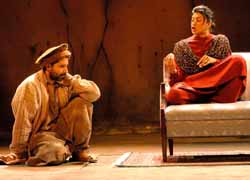
ROBERT HICKS
Tony Kushner's "Homebody/Kabul"
 |
| Firdous Bamji & Rita Wolf in "Homebody/Kabul." Photo by Stephanie Berger. |
BAM Harvey Theater, 651 Fulton St., Brooklyn, NY
May 11-15, 18-22, 25-29 at 7:30 pm; May 15, 16, 22, 23, 29, 30 at 1:00 pm,
$25, $45, $65.
Box office (718) 636-4100 or visit www.bam.org
Note: Latecomers will not be seated during the first hour of the performance.
Reviewed by Robert Hicks May 20.b
It's fitting that a thought-provoking play of ideas ostensibly about the
breakdown of communication between two diverse cultures should be so filled
with language. The Homebody's opening 50-minute "elliptically discursive"
monologue is a rich tapestry of the historical upheavals and cultural displacement
that have developed over centuries to define modern-day Kabul. But it is perhaps
more important that the Homebody's own eccentric personal history lays the
foundation for Kushner's larger themes of loss, uncertainty and displacement
of self.
The Homebody, played by the wonderfully expressive Linda Edmund who is here
reprising her role for which she won an Obie Award and a Lucille Lortel Award
in 2001, reads from an outdated guidebook to Kabul. She speaks of "magic
beliefs stripped away by colonization" and of Aryan settlements on the
Kabul River. Rejection of Macedonian authority gave way to a trade rebirth
in the 3rd century B.C. She talks about the emergence of modern Afghanistan
and the Soviet Union's recognition of Afghan sovereignty in 1921. Now in 1998,
Afghanistan is poor and its infrastructure is decimated by civil unrest and
war. There is no life. Only fear and God's laws can save its people from terror.
Amid the Homebody's personal recollections about her friends resides a dialectical
thesis/antithesis of Might and Do, of contemplation and action, of inertia
and culpability, of guilt and judgment. There emerges a sense of cultural
dislocation and displacement and a wearisome understanding that "the
present is always an awful place to be" and that poetic imagination is
the only power strong enough to restore one's faith in the beauty of life.
Kabul, on the other hand, is a place where the Homebody believes she must go to rediscover herself. It is a place of many languages - French, Pashto, Esperanto, Farsi and English - in which unknowable, political allegiances and faceless women wearing burqas cast a pall of uncertainty. Milton Ceiling (Reed Birney) and his daughter Priscilla Ceiling (Maggie Gyllenhaal in her brilliant New York stage debut) travel to Kabul to find his wife, her mother, the Homebody Englishwoman who may be murdered, may be lost, may be secretly married to a Muslim lover, may be sworn not to write or speak until she discovers Allah.
Kushner has revised many of the Kabul scenes since the play's debut at New York Theater Workshop in December 2001. Guided by the Afghan poet Khwaja Aziz Mondanabosh (Firdous Banji), Priscilla embarks on an emotional journey to find her mother, to discover herself and to realize certainty in life. She is now a richly detailed and fully developed character unlike the unruly, angry young woman in the production in 2001.
In political terms, the play takes place in 1998 during the Clinton administration's attack on Taliban training camps. Kushner has strengthened his Afghan characters, too, and he has balanced the grief and fear felt by the Ceilings as they search for their lost Englishwoman with the grief and suffering of the Kabul community under the rule of the Taliban.
One Afghan woman (Rita Wolf) has been driven to madness by Taliban repression. Uncertainty abounds concerning her true identity. Was she truly the former wife of the Homebody's rumored Muslim lover? Is she a courier forced by the Taliban to take military information about the British and Americans to the Taliban's Northern Coalition in London? Is she a poetic messenger with the text of a mother tongue for all mankind? Is she a replacement for the Homebody or even a surrogate mother for Priscilla? We never know for certain. Kushner's play is indeed a magical world in which things do not appear to be what they really are. As Milton Ceiling says to Priscilla, "It's down the rabbit hole now." Just like events and characters in "Alice In Wonderland."
The final scene does offer some suggestion, however, that the mad Afghan
woman has displaced the self of the Homebody. It's spring 1999 and she now
sits in London in the chair previously occupied by the Homebody. She is learning
English and reading the Koran. Priscilla returns home, sitting in a chair
formerly vacant in her mother's drawing room. She talks to this new woman
in her life. Realizing she has grown as a woman since attempting suicide as
a young pregnant woman, she knows now that her mother had to leave England.
Otherwise, she and Priscilla would have become lost in one another's worlds
of uncertainty and despair. Through the loss of her mother, Priscilla can
now understand her own life and the mad Afghan woman can now go into the garden
and plant the magical greenery that even Paradise envies as the poetic imagery
of life. History can't give us a full or certain account of life and it can't
redress the ugly repression in life, but the strength of the human will to
seek certainty and to be imaginative can sustain life and help us to discover
the beauty in life. [Hicks]

| museums | NYTW mail | recordings | coupons | classified |